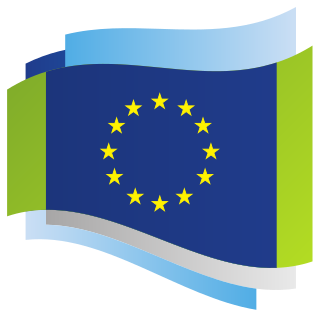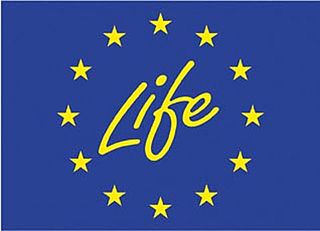
Research and development, known in Europe as research and technological development (RTD), is the set of innovative activities undertaken by corporations or governments in developing new services or products and improving existing ones. Research and development constitutes the first stage of development of a potential new service or the production process.

The European Defence Agency (EDA) is an agency of the European Union (EU) that promotes and facilitates integration between member states within the EU's Common Security and Defence Policy (CSDP). The EDA is headed by the High Representative (HR/VP), and reports to the Council. The EDA was established on 12 July 2004 and is based in the Kortenberg building in Brussels, Belgium, along with a number of other CSDP bodies.

Directorate-General for Communications Networks, Content and Technology is a Directorate-General of the European Commission. DG Connect is responsible for managing the Digital Agenda.
The European Structural and Investment Funds are financial tools set up to implement the regional policy of the European Union. They aim to reduce regional disparities in income, wealth and opportunities. Europe's poorer regions receive most of the support, but all European regions are eligible for funding under the policy's various funds and programmes. The current Regional Policy framework is set for a period of seven years, from 2021 to 2027.

The European Research Council (ERC) is a public body for funding of scientific and technological research conducted within the European Union (EU). Established by the European Commission in 2007, the ERC is composed of an independent Scientific Council, its governing body consisting of distinguished researchers, and an Executive Agency, in charge of the implementation. It forms part of the framework programme of the union dedicated to research and innovation, Horizon 2020, preceded by the Seventh Research Framework Programme (FP7). The ERC budget is over €13 billion from 2014 – 2020 and comes from the Horizon 2020 programme, a part of the European Union's budget. Under Horizon 2020 it is estimated that around 7,000 ERC grantees will be funded and 42,000 team members supported, including 11,000 doctoral students and almost 16,000 post-doctoral researchers.

The Joint Research Centre (JRC) is the European Commission's science and knowledge service which employs scientists to carry out research in order to provide independent scientific advice and support to EU policy. The JRC is a Directorate-General of the European Commission under the responsibility of Mariya Gabriel, European Commissioner for Innovation, Research, Culture, Education and Youth. The current Director General of the JRC is Stephen Quest, who took office on 01/05/2020, succeeding Vladimír Šucha. Its Board of Governors assists and advises the Director-General on matters relating to the role and the scientific, technical and financial management of the JRC.

The Directorate-General for Research and Innovation is a Directorate-General of the European Commission, located in Brussels, and responsible for the European Union's research and innovation policy and coordination of research and innovation activities. It is headed by Commissioner Mariya Gabriel and Director-General Jean-Eric Paquet.
The Executive Agency for Small and Medium-sized Enterprises (EASME) is an Executive Agency of the European Commission. EASME was founded in 2003 as the Intelligent Energy Executive Agency (IEEA) and was renamed the European Agency for Competitiveness and Innovation (EACI) in 2007, finally becoming EASME in 2014. It is responsible for managing specific programmes in the fields of energy, the environment, and business support. Its goal is to promote sustainable development while improving the competitiveness of European industries. While the Agency has its own legal identity, it reports to several Directorates-General of the European Commission, which remain responsible for programming and evaluation of the programmes.
The Framework Programmes for Research and Technological Development, also called Framework Programmes or abbreviated FP1 to FP9, are funding programmes created by the European Union/European Commission to support and foster research in the European Research Area (ERA). Starting in 2014, the funding programmes were named Horizon.
The European Institute of Innovation and Technology (EIT) is an Agency of the European Union established in 2008 to strengthen Europe's ability to innovate. The EIT is an integral part of Horizon 2020, the EU's Framework Programme for Research and Innovation.

The Internal Audit Service or IAS is a Directorate-General (DG) of the European Commission that was established in 2001 to provide an increased accountability of the Commission.
Marie Skłodowska-Curie Actions (MSCA) are a set of major research fellowships created by the European Union/European Commission to support research in the European Research Area (ERA). The Marie Skłodowska-Curie Actions are among Europe's most competitive and prestigious research and innovation fellowships.
The Competitiveness and Innovation Framework Programme (CIP) of the European Commission is meant to improve the competitiveness of European companies facing the challenges of globalization. The programme is mainly aimed at small and medium-sized enterprises (SMEs), which will receive support for innovation activities, better access to finance and business support services. It will run from 2007 to 2013.
The Enterprise Europe Network provides support for Small and Medium-sized Enterprises (SMEs) with international ambitions. Co-funded by the European Union's COSME and Horizon 2020 programmes, the Network's aim is to help businesses innovate and grow internationally.

projects with European added value.

The Directorate-General for Migration and Home Affairs is a Directorate-General of the European Commission. The role of the body is to ensure the EU's security, to build a common EU migration and asylum policy, and to promote dialogue and cooperation with non-EU countries. Thereby, it contributes to the Area of Freedom, Security and Justice (AFSJ).
The European Innovation Council (EIC) was introduced by the European Commission to support the commercialization of high-risk, high-impact technologies in the European Union. The fully-fledged EIC was launched March 2021 under Horizon Europe and is part of the European Innovation Council and SMEs Executive Agency (EISMEA). Its goal is to aid researchers, start-ups and SMEs bring their innovations to market by providing funding, networking & partnership opportunities, and business acceleration services. In its latest form, the concept has been put forth by the EU Research Commissioner Carlos Moedas in mid-2015. It has a budget of €10.1 billion to support game changing innovations throughout the lifecycle from early stage research, to proof of concept, technology transfer, and the financing and scale up of start-ups and SMEs.
European Union's scientific collaboration beyond the bloc describes the European Union's frameworks for bilateral cooperation and specific projects in science and technology with countries and regional blocs situated beyond the European Union.
Cascade Funding, also known as Financial Support for Third Parties (FSTP), is a European Commission mechanism to distribute public funding in order to assist beneficiaries, such as start-ups, scale-ups, SME and/or mid-caps, in the uptake or development of digital innovation.




